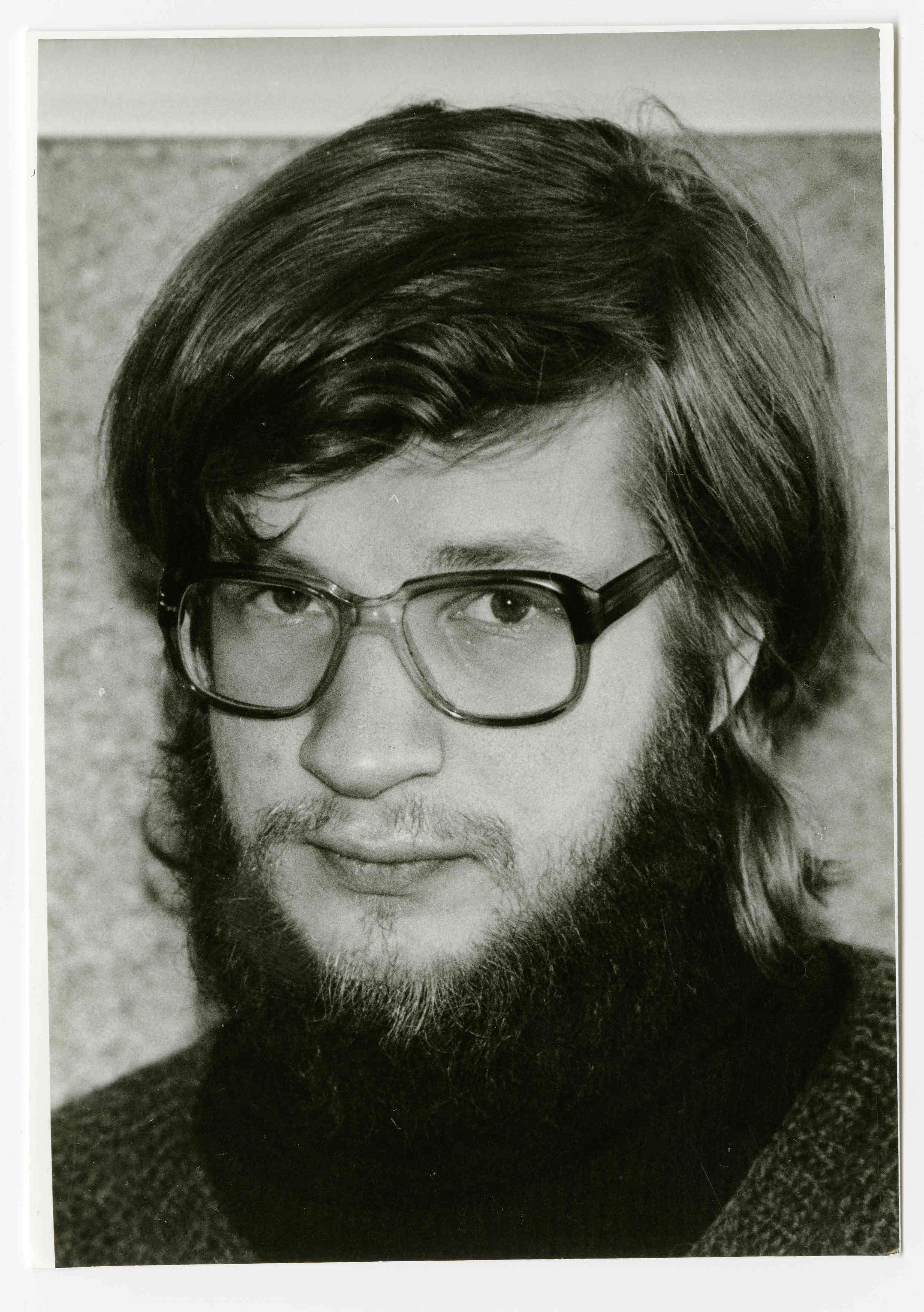
Rein Raud
Rein Raud (b. 21. XII 1961) is a poet, prose-writer, Japanologist and translator.
He was born in Tallinn, the son of the writers Eno Raud and Aino Pervik. From 1969 to 1980 he attended Tallinn 7th Secondary School and from 1980 to 1985 he studied Japanese philology in the faculty of oriental studies at the Leningrad State University. From 1985 to 1987 Raud was dramaturge at the Tallinn Puppet Theatre, from 1988 to 1989 the chief expert on foreign literature of the State Committee on Culture of the Estonian SSR (later the Ministry of Culture) and from 1989 to 1998 the chairman of the Board of the Estonian Institute of Humanities. Raud defended his doctorate with the study “The Role of Poetry in Classical Japanese Literature: A Code and Discursivity Analysis” at the University of Helsinki in 1994, and was Professor of Japanese Language and Culture there from 1995 to 2016. Raud was Rector of the University of Tallinn from 2006 to 2011. His brother is the musician, presenter and writer Mihkel Raud and his sister is the children’s author Piret Raud.
Raud made his debut in 1973 with a prose piece, after which he published short prose in the journals Noorus and Looming, and in the anthology Viis tüdrukut ja kaheksa poissi (‘Five Girls and Eight Boys’, 1977), and Noori autoreid ’77 (‘Young Authors ’77’, 1979). Raud later became a prolific author in all the main spheres of literature.
Raud’s work as a whole, but especially his poetry, has gained impulses from various periods in world literature. His poetry is diverse in form; he has written sonnets and verses in terza rima, and followed other classical European verse forms, while at the same time influences from Japanese poetry are notable. In his collections there are long poems and cycles of verse, in which the epical and the lyrical blend into a whole. Sometimes he has smootly added to his classical poetic forms (such as sonnets) passages of free prose.
As a prose-writer Raud has taken up historical subject matter in several instances. In the novel Kaupo (1990) the fate of the Livonian chieftain is followed from the standpoint of the protagonist himself. Ratsanik Melchior (‘Melchior the Horseman’, 1991) is written in the style of a mediaeval adventure story. It is regarded as one of the most outstanding Estonian fantasy novels. The essay-novel called Hector ja Bernard (‘Hector and Bernard’, 2004) concentrates on the dialogue between two intellectual friends and their contacts with a muse. This work won the Estonian Literature Endowment Annual Award for literature. Raud has also written a short novel influenced by ‘spaghetti westerns’, Vend (‘The Brother’, 2008). A trend toward magic realism is evinced in the novel Hotell Amalfi (‘Hotel Amalfi’, 2011), the short-story collection Vanem paksem tigedam (‘Older Fatter Angrier’, 2013) and the long historical novel Kell ja haamer (‘Bell and Hammer’, 2017). The novel Rekonstruktsioon (‘The Reconstruction’, 2012) deals with the dangers arising from (new) religious extremism. Täiusliku lause surm (‘The Death of the Perfect Sentence’, 2015) is a spy novel, dealing with the end of the Soviet period and the transition era in Estonia, and the attempts by the KGB and apparatus of repression to corrupt people intellectually and morally.
Raud has also published a book of plays, Minotaurus. Kõnelev puu (‘Minotaur. The Talking Tree’, 1988), in which the first play follows the Cretan myth and its characters. As a polyglot, Raud has translated poetry from many languages (Lithuanian, French, Italian, Swahili and others); particularly important are his numerous translations from classical Japanese. He has also published a monograph, Mis on kultuur? Sissejuhatus kultuuriteoriasse (‘What is Culture? An Introduction to Cultural Theory’, 2013) as well as an original theory of culture (in English), Meaning in Action. Outline of an Integral Theory of Culture (2016, in Estonian 2018). With Zygmunt Bauman he has published the correspondence (in English), Practices of Selfhood (2015, in Estonian 2016). Rein Raud has actively taken up his pen in polemics on social issues. In his views he tends toward the social-democratic.
I. M. (Translated by C. M.)
Books in Estonian and English
Poems
Paljajalu. Tallinn: Eesti Raamat, 1981, 64 lk.
Kestmine tuleb seest. Tallinn: Eesti Raamat, 1983, 47 lk.
Lumme mattunud. Tallinn: Eesti Raamat, 1987, 97 lk.
Kaks küünalt. Tallinn: Eesti Raamat, 1990, 86 lk.
Unelindude rasked saapad. Tallinn: Näo Kirik, 2016, 86 lk.
Novels
Kaupo. Tallinn: Eesti Raamat, 1990, 142 lk.
Ratsanik Melchior. Tallinn: Eesti Raamat, 1991, 206 lk. [2. trükk: 2016.]
Hector ja Bernard: esseeromaan. Tallinn: Tuum, 2004, 231 lk.
Hotell Amalfi. Tallinn: Tuum, 2011, 163 lk.
Rekonstruktsioon. Tallinn: Mustvalge Kirjastus, 2012, 263 lk.
Täiusliku lause surm. Tallinn: Mustvalge Kirjastus, 2015, 175 lk.
Kell ja haamer. Tallinn: Mustvalge Kirjastus, 2017, 425 lk.
Viimane kustutab tule. Tallinn: Salv, 2018, 191 lk.
Short stories
Kägude öö. Tallinn: Kupar, 1995, 187 lk.
Pisiasjad, mis omavad tähtsust. Tallinn: Tuum, 2000, 119 lk.
Vend. Tallinn: Tuum, 2008, 115 lk.
Vanem Paksem Tigedam. Tallinn: Mustvalge Kirjastus, 2013, 165 lk.
Plays
Minotauros. Kõnelev puu. Tallinn: Eesti Raamat, 1988, 79 lk.
Non-fiction
The role of poetry in classical Japanese literature: a code and discursivity analysis. Acta Collegii Humaniorum Estoniense, nr 1. Tallinn: Eesti Humanitaarinstituut, 1994, 276 lk.
Mis on kultuur?. Sissejuhatus kultuuriteooriatesse. Tallinn: Tallinna Ülikooli Kirjastus; Eesti Keele Sihtasutus, 2013, 456 lk.
Zygmunt Bauman, Rein Raud, Practices of Selfhood. Cambridge; Malden (Mass., USA): Polity Press, 2015, 153 pp. [Eesti keeles: ‘Iseduse praktikad’, Tallinn: Tallinna Ülikooli Kirjastus, 2016, 228 lk.]
Meaning in Action: Outline of an Integral Theory of Culture. Cambridge; Malden (Mass., USA): Polity Press, 2016, 193 lk. [Eesti keeles: ‘Tähenduste keeris: tervikliku kultuuriteooria visand’, Tallinn: Tallinna Ülikooli Kirjastus, 2018, 311 lk.]
Maailmakirjandus XIX sajandi lõpuni: gümnaasiumiõpik. Tallinn: Maurus, 2017, 208 lk.



